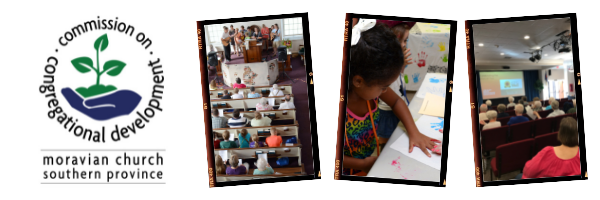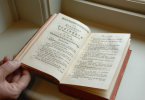Journaling as a Daily Spiritual Practice
Keeping a written record of daily activities, congregational meetings and the general life of the community historically has been an extremely important practice for Moravians. Numerous documents housed in Moravian Archives attest to this fact. Journaling is a way of keeping a record of personal activities as well. It is a discipline that keeps us aware of and connected to our spiritual and emotional life. Journaling may be a new discipline for you, but it can be and should be flexible and very simple. One purpose of journaling as a spiritual practice is to record ordinary and extraordinary everyday happenings and insights between you and God and between you and others.
Whether you are experienced or a novice, journaling is a discipline which may be difficult. Find your best time and way of journaling and use it to clear your own God path. Our inward journey balanced with our outward journey is part of our growth and response to God. However it is done, it will take some time.
Feel free to view journaling as a creative outlet. Give yourself permission to be flexible with your own personal style of journaling. You may feel more comfortable:
- writing in complete sentences and paragraphs;
- writing down only words and phrases without concern for punctuation, structure or design;
- not writing at all, but dictating into a recording device;
- sketching, drawing, painting, etc.;
- making notes on your calendar appointment book, etc.
The rewards of journaling are innumerable. You will very likely encounter struggles with journaling, but you will gain joys and insights as well. Journal entries may reflect prayer concerns, or any other thoughts, feelings, etc., you may want to include. Entries are intended to be personal and private. When journaling, try to find a quiet, uninterrupted time and a comfortable place. Make a journal entry for each morning and/or evening, noting the date, the time you begin journaling, and the time you end.
Be honest. Journaling is a way of recording your truth, your journey. It is a way of externalizing what is going on with you internally. It can be a wonderful opportunity for insight and awareness. Journaling is a way of connecting mind and heart.
If you are having difficulty with journaling, ask yourself:
- Am I judging myself harshly?
- Am I too tired to write at this time?
- What is God saying to me in the difficulty?
- Do I feel the need to talk about something with someone I trust?
Journaling at the Beginning of the Day
Designate time every morning to quietly and purposefully begin your day. This is to be a time and place where you withdraw to yourself, learning to recognize, nurture, and protect the inner self part of you that God created and wants nourished.
Journaling at the beginning of the day is visualized as a hand moves across the page, letting the thoughts and feelings come out of the pen in a free flow of consciousness – to empty yourself over and over again. Nothing is too petty, too silly, too stupid, or too weird, too critical, or too ridiculing to be included. With a stuck place, write through it with “I don’t have anything to say” until something else comes. The time for this particular kind of journaling is first thing in the morning, before your inner critic is operable.
When you get up, move immediately into writing. The purpose is to avoid the inner critic or to write through what the inner critic is saying to you in order to empty yourself and thus clear a path for God to speak to you. We muddy up our God hearing and listening path, our gateway to God, with our eternal and external critic. Write through these blocks clearing your path to God.
Journaling at the End of the Day
Finding the time and the energy at the end of a busy day is hard. Simply jot down words, phrases, sentences or paragraphs at a designated time each evening as you review your day. If you don’t like to write, feel free to draw, sketch, paint, talk into a recording device, etc. Use your creativity and imagination as to how you would like to get in the habit each evening of looking back on the day and somehow recording your journey with yourself, others, and God. This is not a time of reporting to anyone – rather, it is a time of taking a break to reflect; to be with yourself and God; a time of release and relief.
Designate time every evening to quietly and reflectively review your day. This is to be a time and place where you allow your stream of consciousness to flow; your thoughts and feelings flow. Journaling is an end of the day release and relief. Let yourself be in this process, allowing no censoring, correcting, or judgement of yourself or your day. Perhaps wonder with yourself where you touched significant people, emotions, or activities in God’s world during this day.
Write down what you think and feel about what happened to you during the day – your experiences with yourself, God, and others are your truth and this journey you are on and, it is hoped, long after this. Use your creativity to listen to God, yourself, and others through journaling as writing, drawing, or whatever your creativity decides on. You may consider integrating into your evening journaling practice the following questions, based on the Great Commandment found in Matthew 22:34-40, Mark 12:28-31, and Luke 10:25-28:
- How did I love and serve God today?
- How did God love and serve me?
- How did I love and serve myself?
- How did I love and serve others?
- How did others love and serve me?
Resources
- Journaling as a Daily Spiritual Practice (PDF)







